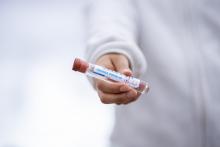To date, pathogenic examination of SARS-CoV-2 virus RNA using RT-PCR is considered the gold standard method for diagnosis. However, this test is accompanied with high false negative rate mainly due to the difficulty of sampling. In addition, application of this test to screen suspected patients is currently limited by the lack of sufficient supply of experimental reagents, facilities and well-trained operators in many countries. Serological test of antibodies (Abs) against SARS-CoV-2 virus in patients is a complementary approach. As patients will inevitably develop Abs against the virus, Ab level might be a reliable parameter of COVID-19 infection. Additionally, kinetic monitoring of Ab may help prognosis and prevent relapse. However, to our knowledge, this has been less well studied. There are two major forms of Ab test available on the market: (i) ELISA and, (ii) immunochromatography. ELISA-based detection is quantifiable but not time, cost and labor efficient. Immunochromatography-based tests are rapid and convenient but suffer from the lack of quantifiability and less reliability.
Motivated by the current urgency due to the pandemic, University of Toronto researchers (with extensive expertise in protein engineering) are developing a set of novel immunoassays for detecting anti-CoV-2 antibodies (IgM and IgG) directly in patients sera based on protein complementation assay (PCA), specifically on tri-part split NanoLuc. For this, they are repurposing their recently developed and patented Split Intein-Mediated Protein Ligation (SIMPL) (1) detection assay to develop an innovative diagnostic immunoassay for detecting anti-SARS-CoV-2 Abs directly from COVID-19 patient sera by adapting the tri-part split NanoLuc assay.
OPPORTUNITY
COVID-19 is caused by the new corona virus SARS-CoV-2. Its global outbreak has already led to more than 743,000 confirmed cases and close to 36,000 deaths, and these number are still growing rapidly everyday. Despite the fact that COVID-19 is a highly contagious disease, so far there is no specific treatment and preventative measure. Once it has infected a person, SARS-CoV-2, the virus causing COVID-19, is currently detected primarily by RT-PCR based genetic tests that look directly for the presence of viral RNA in either nasal or throat swabs. However, we still don’t have a robust estimate of the number of people that have actually been infected by SARS-CoV-2, and a better way to determine exactly how widely the virus has spread in the population would be to look at people’s blood.
COMPETITIVE ADVANTAGE
The novel immunoassay for detection of IgG and IgM Abs directly in people’s blood, offers several major advantages compared to ELISA and ICMT assays:
(i) highly quantitative;
(ii) compatible to large scale investigation;
(iii) fast performance;
(iv) limited procedures;
(v) small volume of blood sample required;
(vi) no need for special equipment beside a common plate reader, and
(vii) no need for special training for operators.





